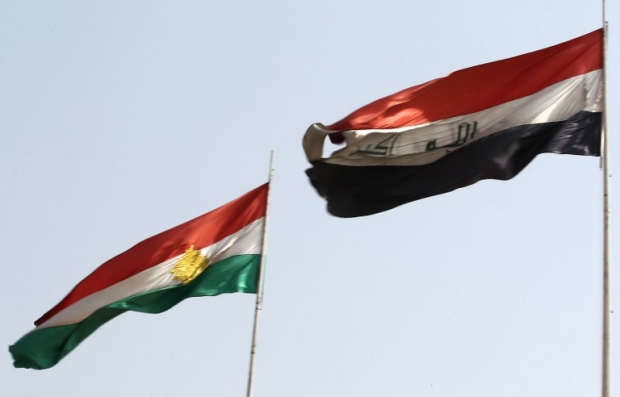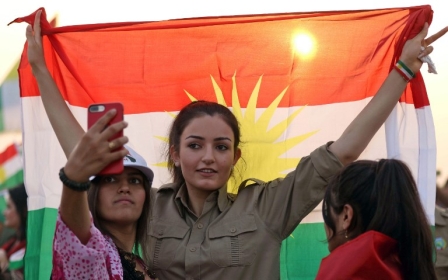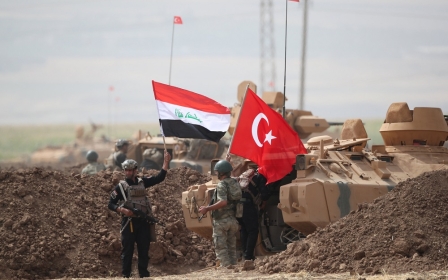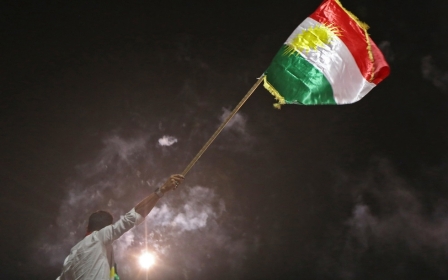Iraq gives Kurdistan three days to hand over control of airports to avoid embargo
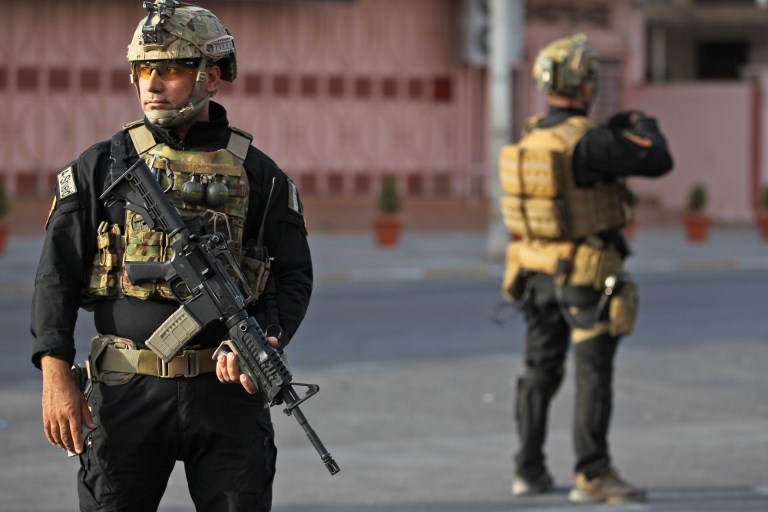
The Iraqi government gave the Kurdistan Regional Government (KRG) three days to hand over control of its airports in order to avoid an international air embargo, Prime Minister Haider al-Abadi said, according to state TV.
The measure is meant as a retaliation against the independence referendum held by the KRG in northern Iraq on Monday.
Baghdad last week asked foreign countries to stop direct flights to the international airports of Erbil and Sulaimaniya, in KRG territory, but only Iran declared such an air embargo, halting direct flights to Kurdistan.
Votes from the poll were still being counted on Tuesday evening, with results expected by the end of the day and no doubt of an overwhelming outcome in favour of independence.
But KRG President Massoud Barzani said late on Tuesday the "yes" vote had won. In a televised adress, he called on Iraq's central government in Baghdad to engage in "serious dialogue (...) instead of threatening" the KRG with sanctions. Iraq's prime minister has ruled out holding talks on Kurdish independence.
"We may face hardship but we will overcome," Barzani said, calling on world powers "to respect the will of millions of people" who voted in the referendum.
The Iraqi government ruled out talks on Kurdish independence on Tuesday, and Turkey threatened to impose a blockade.
The Kurds, who have ruled over an autonomous region within Iraq since the 2003 US-led invasion that toppled Saddam Hussein, consider the referendum to be an historic step in a generations-old quest for a state of their own.
Iraq considers the vote unconstitutional, especially as it was held not only within the Kurdish region itself but also on disputed territory held by Kurds elsewhere in northern Iraq.
Baghdad said on Tuesday there would be no independence talks in the wake of the vote.
"We are not ready to discuss or have a dialogue about the results of the referendum because it is unconstitutional," Iraqi Prime Minister Haider al-Abadi said.
Abadi ordered the Kurds to hand over control of their airports to the central government within three days or face an international embargo on flights.
Abadi, a moderate from Iraq's Shia Arab majority, is coming under pressure at home to take punitive measures against the Kurds. Hardline Iranian-backed Shia groups have threatened to march on Kirkuk.
"We as Popular Mobilisation would be fully prepared to carry out orders from Abadi if he asks to liberate Kirkuk and the oilfields from the separatist militias," said Hashim al-Mouasawi, a spokesman for the al-Nujabaa paramilitary group.
Turkish movement
The warning over Kurdish airports came after Iraqi soldiers joined Turkish troops for military exercises in southeast Turkey near the border with Iraq on Tuesday, as the two countries coordinate steps in response to the Iraqi Kurdish independence referendum.
A small group of soldiers holding aloft an Iraqi and a Turkish flag walked across the dusty plain where the exercises, launched last week, were being held some 4km from the Habur border gate, the witness said.
The flags were then held aloft from the top of an armoured personnel carrier. National and international media observed the exercises from the main highway leading to the border gate.
Kurds voted in large numbers in an independence referendum in northern Iraq on Monday, ignoring pressure from Baghdad, threats from Turkey and Iran, and international warnings that the vote may ignite yet more regional conflict.
Initial referendum results indicated 72 percent of eligible voters had taken part and an overwhelming majority, possibly over 90 percent, had said "yes", Kurdish TV channel Rudaw said. Final results are expected by Wednesday.
Recep Tayyip Erdogan, the Turkish president, has threatened to cut off the pipeline that carries oil from northern Iraq to the outside world, intensifying pressure on the Kurdish autonomous region over the referendum.
Tehran also vowed to stand alongside Baghdad and Ankara against the outcome of an independence referendum on Tuesday, a day after thousands of Iranian Kurds marched in support of the vote.
State media in Iran quoted an army commander as saying that new missile systems were installed on Tuesday, a day after the referendum, in western provinces that border Iraqi Kurdish areas to "firmly respond to any invasion".
Iran, Iraq and Turkey - countries with Kurdish minorities - have all denounced the referendum as a threat to the stability of a region already beset by conflict, while the United States has expressed similar disquiet.
Iranian fears
Ali Akbar Velayati, the top adviser to Iran's Supreme Leader Ayatollah Ali Khamenei, stepped up the pressure as the Iraqi government ruled out talks on possible secession for Kurdish-held northern Iraq and Turkey threatened sanctions.
"The Iraqi people won't stand silent. Iran and Turkey and other regional countries won't stand silent and will stand against this abhorrent deviation," Velayati was quoted as saying by ISNA news agency. "The Muslim nations will not allow the creation of a second Israel."
Velayati did not say what action Iran had in mind. However, the country's media have compared the Kurds' desire for a homeland with the 1948 creation of Israel. The Islamic republic regards the Jewish state as its greatest enemy along with the United States.
Undaunted by years of official suppression of dissent, residents in a number of mainly Kurdish cities in northwestern Iran danced in circles as night fell on Monday, chanting slogans praising Kurdish nationalist movements.
Videos posted on social media showed drivers beeping their car horns in celebration and people clapping in the cities of Marivan and Baneh. Many wore masks so as not to be identified by the security forces.
About 30 million ethnic Kurds are scattered across the region but have no country of their own. With 8 to 10 million living in Iran, Tehran fears pressure for secession will grow among a minority which has a long history of struggle for its political rights.
A strong police presence tried to control the celebrating crowd. There were reports of clashes between the demonstrators and security forces in the cities of Mahabad and Sanandaj.
In Sanandaj the crowd waved the flag of Kurdistan, a banned symbol for the Kurds' desire for independence.
Encouragment for Iran's Kurds
"This referendum will encourage Iranian Kurds to be more determined to seek their rights," said Zaribar, a Marivan resident and member of the Democratic Party of Iranian Kurdistan, a secular armed group which launches periodic attacks in Iran.
"This referendum was not a threat to Iraq's neighbours, but it's a starting point to resolve the issues of Kurds, especially in Iran," added Zaribar, who declined to give his full name.
Tehran announced a ban on direct flights to and from Iraqi Kurdistan on Sunday at the request of the central government in Baghdad and called for a land blockade of the autonomous region by all neighbouring countries.
Media gave no further details of the newly-installed missile systems. However, Iranian fighter jets flew in a show of force over western provinces of Iran as part of a military drill, including the Kurdish cities of Sardasht and Oshnavieh.
Israel has backed Kurdish independence. It has maintained discreet military, intelligence and business ties with Kurds since the 1960s, viewing the minority as a buffer against shared adversaries.
Stay informed with MEE's newsletters
Sign up to get the latest alerts, insights and analysis, starting with Turkey Unpacked
Middle East Eye delivers independent and unrivalled coverage and analysis of the Middle East, North Africa and beyond. To learn more about republishing this content and the associated fees, please fill out this form. More about MEE can be found here.


